教师资格证初中英语面试定语从句(Attributive Clause)简易教案和英文试讲稿
- 格式:pdf
- 大小:3.78 MB
- 文档页数:6
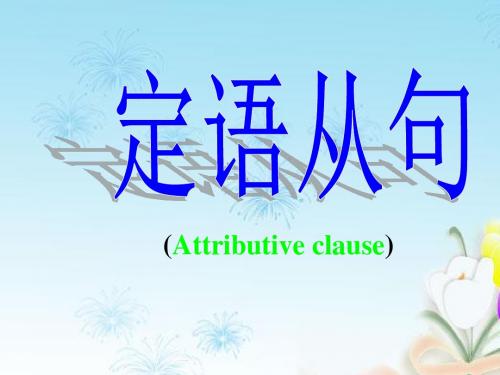

定语从句语法专题(Attributive Clauses)教案一.定语从句的概述:1.定语从句:在复合句中,修饰某一名词或代词的从句叫定语从句。
在句中做定语,被修饰的名词或代词,叫做先行词。
从句通常放在先行词之后,由关系词(关系代词或关系副词)引导。
其作用是作定语修饰主句的某个名词性成分,相当于形容词,所以又称为形容词性从句,一般紧跟在它所修饰的先行词后面。
eg She is the girl(who got the first prize.)girl先行词who充当从句主语,从句做定语修饰girlThis is the boy who broke the window.这就是打破窗子的孩子。
the boy是先行词,who broke the window是限制性定语从句,明确指出theboy是打破窗子的那个孩子,who 在从句中充当主语That is the house where he lived ten years ago.He is the man who/that lives next door.He is the man who I want to see.先行词关系词定语从句复合句:是由一个主句和一个或一个以上的从句构成的句子,复合句中的主句和从句都具有完整的的主语和谓语,主句是复合句的主体,可以独立存在,从句需要有一个连词引导,是修饰说明主句的,不能独立存在,根据在句中的不同作用,从句可以分为三类:定语从句,名词性从句,状语从句。
二.引导定语从句的关系词有两大类:1. 关系词:引导定语从句的关联词称为关系词,关系词有关系代词和关系副词。
关系代词:that, who, whom, whose, which,as(主,宾,定)关系副词:when, where, why.(状语)2. 关系词的作用:(1)引导定语从句,在先行词和定语从句之间起连接作用;(2)代替先行词在句中充当成分。
三.定语从句的分类:限制性定语从句非限制性定语从句1.限定性定语从句:限制性定语从句是先行词在意义上不可缺少的定语,如果去掉,主句的意思就不完整或者失去意义。
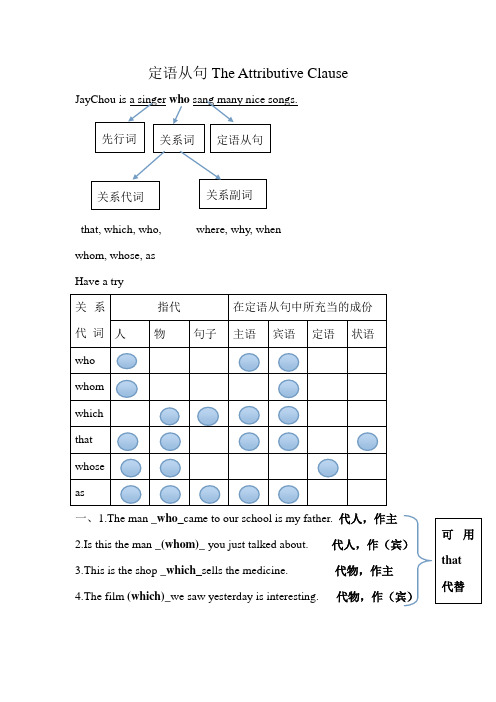
定语从句The Attributive Clause JayChou is a singer who sang many nice songs.that, which, who, where, why, whenwhom, whose, asHave a try 关系代 词 指代 在定语从句中所充当的成份 人物 句子 主语 宾语 定语 状语 whowhomwhichthatwhoseas一、1.The man _who _came to our school is my father. 代人,作主2.Is this the man _(whom)_ you just talked about. 代人,作(宾)3.This is the shop _which _sells the medicine. 代物,作主4.The film (which)_we saw yesterday is interesting. 代物,作(宾) 关系代词 关系副词 关系词 先行词定语从句可用that 代替定义:定语从句:修饰某一名词或代词的从句叫定语从句。
先行词:被定语从句修饰的词叫先行词关系词:引导定语从句的词叫关系词。
关系词在句中起连接作用,是由关系词代表先行词在从句当中充当的成份决定。
注意:1.可用that 代替2.作宾语可以省略二、定语5.This is the boy _whose_ mother is a doctor.6.I like those books _whose_ topic are about history.代人的 定语代物的 定语 三、及物动词与不及物动词7. I still remember the day _when _ I first came here.8. This is the house _where_ I lived last year. 9. I don ’t know the reason _why_ he was late.如何选定定语从句的关系词1.首先分清主句和定语从句2.确定定语从句的先行词3.把先行词带回到定语从句中去,看其在定语从句中做什么成份(主语,宾语,定语或状语)4.若先行词在从句中 做主语,宾语或定语则用关系代词;若在从句中做状语,则选择关系副词who:The man who helped you is Mr. White.whose作状语This is the person who you want to see.whom :The person whom Tom is talking to is my father.which:The film which we just talked about is very interesting.A dictionary is a useful book which tells us the meaning of words. that :The man that helped you is Mr. White.This is the person that you want to see.whose :He has a friend whose father is a doctor.I’d like a room whose window looks out over the sea.比较下列五个句子。
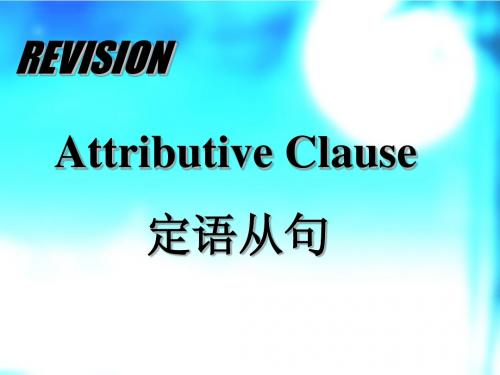
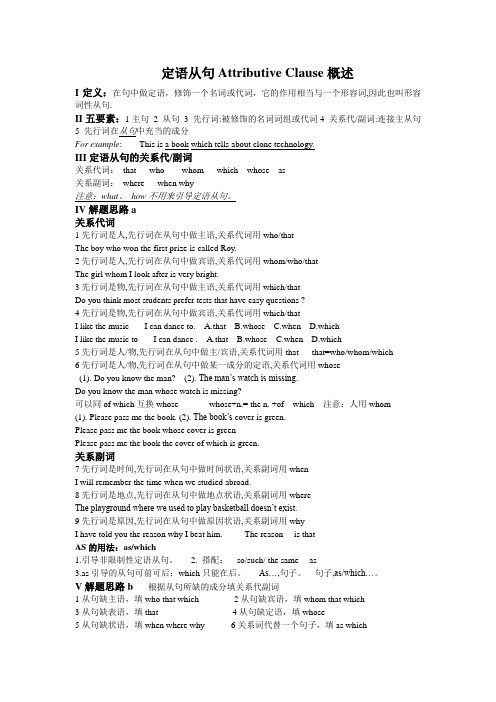
定语从句Attributive Clause概述I定义:在句中做定语,修饰一个名词或代词,它的作用相当与一个形容词,因此也叫形容词性从句.II五要素:1主句2 从句3 先行词:被修饰的名词词组或代词4 关系代/副词:连接主从句5 先行词在从句中充当的成分For example: This is a book which tells about clone technology.III定语从句的关系代/副词关系代词:that who whom which whose as关系副词:where when why注意:what、how不用来引导定语从句。
IV解题思路a关系代词1先行词是人,先行词在从句中做主语,关系代词用who/thatThe boy who won the first prize is called Roy.2先行词是人,先行词在从句中做宾语,关系代词用whom/who/thatThe girl whom I look after is very bright.3先行词是物,先行词在从句中做主语,关系代词用which/thatDo you think most students prefer tests that have easy questions ?4先行词是物,先行词在从句中做宾语,关系代词用which/thatI like the music ___I can dance to. A.that B.whose C.when D.whichI like the music to ___I can dance . A.that B.whose C.when D.which5先行词是人/物,先行词在从句中做主/宾语,关系代词用that that=who/whom/which6先行词是人/物,先行词在从句中做某一成分的定语,关系代词用whose(1). Do you know the man? (2). The man’s watch is missing.Do you know the man whose watch is missing?可以同of which互换whose whose+n.= the n. +of which 注意:人用whom (1). Please pass me the book. (2). The book’s cover is green.Please pass me the book whose cover is greenPlease pass me the book the cover of which is green.关系副词7先行词是时间,先行词在从句中做时间状语,关系副词用whenI will remember the time when we studied abroad.8先行词是地点,先行词在从句中做地点状语,关系副词用whereThe playground where we used to play basketball doesn’t exist.9先行词是原因,先行词在从句中做原因状语,关系副词用whyI have told you the reason why I beat him. The reason ---is that---AS的用法:as/which1.引导非限制性定语从句。
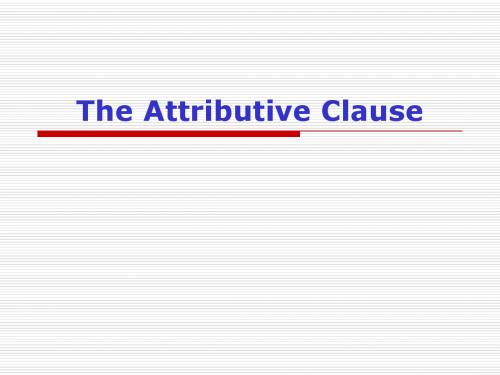
修饰的名词,词组或代词或句子即先行词。
定语从句通常出现在先行词之后,由关系词(关系代词或关系副词)引出。
关系代词有:who, whom, whose, that, which等。
关系副词有:when, where, why等。
I关系代词所代替的先行词是人或物的名词或代词,并在句中充当主语、(宾语)、定语等成分。
关系代词在定语从句中作主语时,从句谓语动词的人称和数要和先行词保持一致。
1)who, whom, that这些词代替的先行词是人的名词或代词,在从句中作主语和宾语。
例如:Is he the man who/that wants to see you?(who/that在从句中作主语)He is the man whom/ that I saw yesterday.(whom/that在从句中作宾语)2)whose 用来指人或物,(只用作定语, 若指物,它还可以同of which互换)。
例如:They rushed over to help the man whose car had broken down.那人车坏了,大家都跑过去帮忙。
Please pass me the book whose (of which)cover is green.= the cover of which is green.3)which, that所代替的先行词是事物的名词或代词,在从句中可作主语、宾语等。
例如:A prosperity which / that had never been seen before appears in the countryside. 农村出现了前所未有的繁荣。
(which / that在句中作宾语)The package (which / that)you are carrying is about to come unwrapped. 你(which / that在句中作宾语)II.1)关系副词when, where, why的含义相当于"介词+ which"结构,因此常常和"介词+ which"结构交替使用。
Lecture Two Attributive ClausesI.Definition: An Attributive Clause is a clause that serves as attribute, generally post-position,in a sentence.II. Two essential things to take note of:A. The Antecedent: that part the clause modifies/the relative refers toB. The Relative: the word (pronoun/adverb) that relates the clause to the Antecedent, andfunctions as an element in the clause.Relatives are classified into:Relative Pronouns: who, whom, whose; which, that, what, as, but, etc.Relative Adverbs: when, where, why, that, etc.e.g. One who says that is mistaken.The man (whom/who/that) I saw yesterday is named Smith.The girl whose father was a Red Amy man is the youngest in her class.The house whose roof was damaged in the earthquake is now under repair.This is the book (which) I bought yesterday.It stormed all day, during which time the ship broke up.Did you see the letter that came early in the morning?He went to the meeting and, what was worse, insisted on speaking.Such women as knew Tom thought he was honest.There is no one but knows it (who doesn’t know it).At that time when I saw him, he was quite well.We will start at the point where we left off.He refused to disclose the reason why he did it.I stay at home on the days that/when I am not busy.Please suggest a place (that/where) we can meet.The reason (that/why) I came should be clear to you.I didn’t like the way (that) she spoke to me.Ⅲ. Choice of RelativesA. Relative pronouns1. Who/that/when the antecedent refers to a person, but who is more preferable when itfunctions as subject in the clause while that is more preferable when is functions as object in the clause.e.g. Is he the man who/that sells dog?He is a man (that/whom/who) people like at first sight.2. Use which/that/when the antecedent refers to a thing, but that is more preferable,especially in oral English.e.g. Here is a book that/which describes animals.This is the book (that/which) you want.3. Use who/whom when the antecedent refers to a person, and which when it refers to athing in a Non-restrictive Attributive Clause.e.g. My sister, who is a nurse, came home last week.I spoke to Dr .Bradley, whom I met after the meeting.The current , which is very rapid, makes the river dangerous.She was fond of French, which indeed she spoke well.4. Use whom (not who) referring to a person, and which (not that) referring to a thing, when the relative is right after a preposition.e.g. The man from whom I bought it told me how to oil it.Here is the car about which I told you days ago.5. Use that (never who/which) in the following cases:a. When the antecedent is any of the indefinite pronouns such as all , little, few, much,none, etc. referring to something.e.g. All that glitters is not gold.There is not much that can be done.Are there any stations in the street?--- None that I know of.b. When the antecedent is modified/preceded by any of the Indefinite Determiners such asany, every, acc, no, etc.e.g. Any boy that wants to succeed must work hard.All the people (that) I wrote to agreed to come.Goats and sheep eat every plant (that) they can find.There is no difficulty that we can’t over come.c. When the antecedent is any of the compound indefinite pronouns something, anything,nothing, etc.e.g. I can tell you something that is very interesting to all.He never says anything that must be kept secret.I’m determined, and nothing (that) you say will change my mind.d. When the antecedent is modified by an adjective in it superlative degree.e.g. He is the bravest man that has ever lived.Yesterday was one of the coldest days that I have ever known.They eat the finest food that is available.e. When the antecedent is modified by the ordinal numerals or words denoting solenesssuch as last, next, etc. or words expressing emphasis such as only, very, etc.e.g. Which was the first/next steamship that crossed the Atlantic?You are the very boy (that) I have been looking for.The only thing (that) you can do now is to hope for the best.f. In a left sentence.e.g. What was it that he wanted?Was it you that broke the window?It was John who/that wore a white shirt at the dance.g. When the antecedent is the interrogative pronoun who or which.e.g. Who that have worked with him do not like him?Which of us that is 30 years old has not read the book?h. When the antecedent is a person and the relative functions as complement in the clause.e.g. He is not the man that he was.I’m not the fool that you thought me.I. When the antecedent refers to both persons and things.e.g. He talked a lot about the men and the books that interested him.6. Use who (not that) in the following cases.a. When the antecedent is those, one or he (indefinite pronoun).e.g. Will those who wish to go stand up?One who is not diligent will never prosper.He/One who makes no mistakes, makes nothing.b. When the antecedent is any of the compound indefinite pronouns: somebody, nobody,someone, anyone, no one, etc.e.g. Anyone who wants to may take part in the contest.There is someone who wants to speak to you.7. Use which (not that or who) in the following cases.a. When the antecedent, though a collective noun, denotes a whole (team), instead of itsmembers.e.g. He liked the family which was happy and friendly.c.f. I joined the family who were walking on the beach.b. In a non-restrictive clause, with the main clause, or a part of it, or a noun not referring toa person, as the antecedent.e.g. He changed his mind, which made me very angry.He has to work on Sundays, which he doesn’t like.Whenever I met him, which was fairly often, I liked his sweet smileHe looked like a lawyer (profession/identity), which he was not.8. as or whicha. Both can be used in the Non-restrictive Attributive Clause, but as-clause is flexible inposition: before or after the main clause, or in the middle of it, while which-clause is fixed in position: only after the main clause. After the main clause, they are interchangeable.e.g. As was expected, he did a very good job.As is known to all, English is very useful.English, as is known to all, is very useful.English is very useful, as/which is known to all.He was a foreigner, as/which I knew from his accent.b. Use as when the antecedent is the same or is modified/preceded by the same, so..., oras...e.g.The situation remains the same as/that it was four years ago.Here is so big a stone as no man can lift.Rosy is as good a girl as (anybody) can be.9. When what as a relative introduces a Non-restrictive Attribute serving as a parenthesis, it usually precedes the antecedent (the main clause or part of it).e.g. He is an interesting speaker and, what is more important, he knows his topicthoroughly.Then I discovered, what was news to me, that his wife was Peter’s niece.10. Use but when the relative means“that/who...not”.e.g. There is no tree but bears some fruit.There is no one but knows him.There are very few but admire his talent.There is none of us but wishes to help you.Not a day went by but brought us good news.Ⅳ. Attributive clause, restrictive or non-restrictiveRestrictive vs Non-restrictiveRestricting the meaning Giving further/complementaryof the antecedent; explanation to the Antecedent; Indispensible to the Dispensable to the essentialessential meaning of the meaning of the sentence;sentence (closely related Separated from the main clause by a comma to the Antecedent); or a dash, etc.Not separated from themain clause by punctuation marks.e.g. People congratulated the man who had just won the Noble Prize for literature.People congratulated Ernest Hemingway, who had just won the Nobel Prize.A mother who loves her son very much will devote herself to his well-being.The boy’s mother, who loves her son very much, will devote herself to his well-being.The house which/that I bought last year has a lovely garden..My house, which I bought last year, has a lovely garden.The boys who wanted to play football were disappointed when it began to rain. (Part)The boys, who wanted to play football, were disappointed when it began to rain. (Whole)His aunt who lives in Chengdu came to see him yesterday. (More than one aunt)His aunt, who lives in Chengdu, came to see him yesterday. (Only one aunt)I will not wear any clothes that/which distinguish me from others.I will not wear any clothes, which will distinguish me from others.The place where Lu Xun was born is Shaoxing.Next week, we are going to visit Shaoxing, where Lu Xun was born.V. Attributive Clause condensed/shortened into phrasese.g. The man (who is) sitting beside/next to me now spoke on the radio last night..The man (that is) being questioned by the police is my brother.The language (that is) spoken all over the world is English.The report (that was) written by my colleague appeared last week.Any coins (that are) found on this site must be handed over to the police.The naughtiest pupil in her class is an 11-year-old boy (that/who is) named Zhang Huike. Foreigners (who join) joining a Chinese dinner party should know and follow Chinese table manners.Do you know any other words (that were) borrowed from other language?Days (that are) gone by are days (that are) forgotten.The man (who can help you) able to help you is Johnson.In years (that are to come) to come, he will regret having left the country.The time (when you should go) for you to go is July.The place (where he should stay) for him to stay is the university guest house.He had a good reason (he should be angry) to be angry.He was the first (that arrived) to arrive and the last (that left) to leave.Ann, (who is) my best friend, was here last night.Mrs. Hamilton, (who was) kind and generous, offered her help.The woman (who is) with her child is Joan.The church (which is) on the square is very beautiful.。